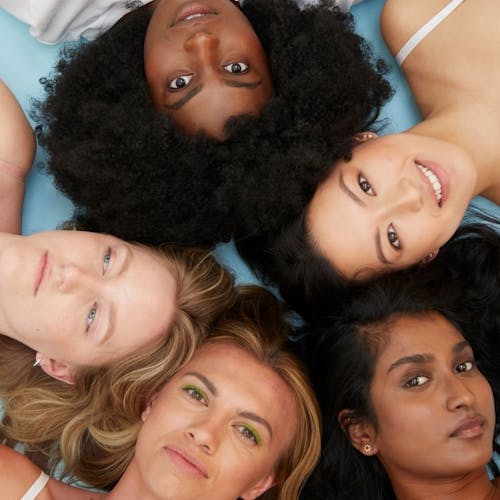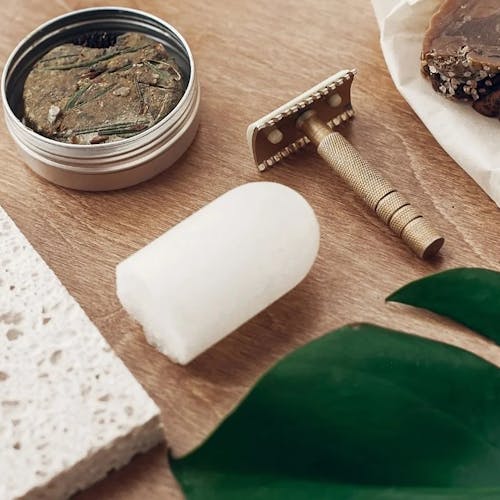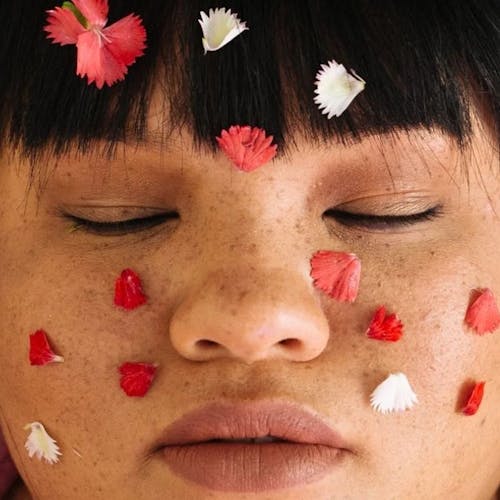This website uses cookies to enhance the user experience. By using Yoppie you are agreeing to our use of cookies.
Period Acne 101: What Is It & What Can I Do?
Written by Yoppie
06 Aug 2021
Is period acne different from regular acne?
Why does period acne happen?
When does it happen?
How do I stop it?
It’s really getting me down. What should I do?
Got the dreaded pre-period acne? Don’t worry, most people with periods have the same thing, or at least will have had at some point in their life. Period acne can be incredibly frustrating, but it’s normal and nothing to worry about. Here, we’re looking at why this complexion conundrum happens every month, what your skin is actually doing, and what you can do about it to get back the skin you know and love. Let’s explore...
Is period acne different from regular acne?
Studies have found that premenstrual acne is thought to affect 50-80% of those who menstruate. Regular acne can come from all different sources. These can be external, like using products that don’t suit your skin, a buildup of oils and impurities, or a change in the weather. Or they could be internal, like your diet and lifestyle, or… yes, we’re going to say it… hormones.
Hormones are closely connected to skin, and these are often the cause of period-related acne. Teenagers going through puberty tend to suffer from hormonal acne that appears along the T-zone (the forehead, nose and chin) when their hormones are in overdrive. Hormonal acne in adults tends to look a little different, coming up mostly on the lower half of the face, like the bottom of the cheeks and around the jawline. This could look like blackheads, whiteheads, small blemishes that eventually come to a head, or deeper cysts that are painful, don’t always reach the surface, and are infuriatingly hard to cover with concealer!
Why does period acne happen?
It can feel like the universe's way of making you cancel plans, but it’s actually a very common bodily reaction to monthly hormone fluctuations. Before your period, the hormones estrogen and progesterone decrease, causing sebaceous glands to secrete more sebum. This is an oily substance that lubricates the skin, and when there’s too much of it, it can clog pores and cause breakouts and inflammation. Towards the end of your period, testosterone can also fluctuate and trigger sebaceous gland sensitivity.
When does it happen?
Period-related acne tends to follow the classic PMS symptoms and arrive alongside your bloating, irritability, fatigue and the rest, but everyone is different, so yours might come along at another time. Most people who get hormonal acne find their existing skin issues worsen just before their period, while others who normally have very clear skin could break out in the week leading up to menstruation, and/or throughout.
Whenever your breakouts tend to happen, make a note so you can be prepared, and maybe even plan ahead by giving your skin a breather from makeup in the lead up to your period, or avoiding things like alcohol that can affect the skin.
How do I stop it?
It’s the age-old question; how do I stop my acne from taking over my life?! Everyone’s skin and hormones are completely different when it comes to tackling acne, but there are a few general things you could try to improve the effects of hormonal acne:
- Go makeup free – Makeup isn’t usually a cause of acne, but if you’re trying to cover up spots with excessive amounts of powders and pastes and whatnot (we’ve all been there!) it may clog pores further. Let skin breathe for a few days to calm redness and inflammation. If you don’t feel comfortable going out without makeup, you can still let your skin breathe by removing makeup as soon as you’re home, and don’t sleep in it.
- Avoid hot water and sweating - Don’t use hot water to wash, as this can irritate skin further. Lukewarm water should do the trick without inflaming skin. Also, avoid sweating if possible, or be sure to wash your face after sweating, such as at the gym.
- Avoid popping spots – It’s so tempting, we know. That crater on your face full of grossness that you just want to get out? Don’t touch it. Picking is a sure-fire way to increase redness and introduce new bacteria into pores. It’s a short-term relief that can lead to long-term inflammation, so try your very best not to do it.
- Use a gentle cleanser – If you’re used to using a lot of masks and serums and lotions and potions, it’s time to take it down a gear on the skincare and go back to basics. A gentle cleanse (twice a day, max) will clear skin of impurities without overloading it with unnecessary products or using harsh scrubs that do more harm than good.
It’s really getting me down. What should I do?
Acne is a very common problem, but for some it feels incredibly frustrating, disheartening and isolating. If hormonal acne is affecting your mental health in a negative way, or causing you to avoid going out and enjoying life, then it may be time to speak to a professional.
A doctor may be able to provide more intense medicated products, or even recommend birth control. Adjusting or starting birth control could help balance hormones that are causing your acne. Alternatively, you could speak to a dermatologist who can use specialist tools to examine your skin and recommend tailored products and regimes that may help.
Do you suffer from hormonal acne? If you have questions about how your period relates to your skin issues, feel free to get in touch with us in our private Facebook group or on Insta @itsyoppie. Don't forget that our personalised period box can get organic tampons, hormonal supplements and much more delivered easily and regularly through your letterbox so you've got one less thing to worry about during your cycle.
Section jump
Back to top
Subscribe To Our Newsletter
YOPPIE





© 2026 Yoppie is a registered trademark of Phlo Technologies Ltd.
Yoppie's supplements are not a substitute for a varied diet and healthy lifestyle and are not intended to diagnose, treat, or cure any disease. If you are pregnant, breastfeeding, have a medical condition or are under medical supervision, please consult with your doctor before taking any of our products.






